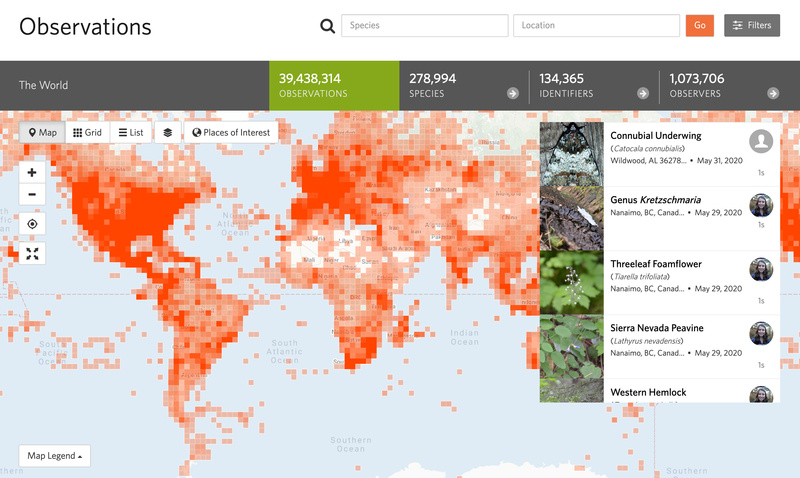e-Learning Ecologies MOOC’s Updates
Week 1 Peer-graded Assignment: Affordance 1 - Ubiquitous Learning
Citizen science and virtual schools: iNaturalist
iNaturalist (www.inaturalist.com and other regional iNaturalist platforms), developed by the California Academy of Sciences and the National Geographic Society, is a worldwide citizen science project in which not only scientists but the public – educators, learners, local communities, individuals – can take part in scientific research and collect scientific data. Citizen scientists can learn through their participation while contributing to scientific knowledge. Citizen science can be used to further education and learning, and also offers an opportunity for people and communities outside the scientific establishment to be heard ‘in relation to scientific policy-making and governance’ (Roche, et al.).
iNaturalist is essentially a global social network for citizen scientists. A contributor uploads a photograph and location of a plant or animal on their mobile device, identifying it if they can. If they cannot, they can ask other users for help in identification, or use the site’s artificial intelligence algorithm to identify the species (SANBI News Room). The community confirms, provides, refines or corrects the identification and contributes more details. The iNaturalist maps the location on Google Maps using the GPS systems of mobile devices and users can also search maps for particular information.
If an observation meets certain criteria, it is deemed ‘Research Grade’ and iNaturalist share the data gathered with the Global Biodiversity Information Facility (GBIF) which provides open access to data ‘about all types of life on Earth’ (GBIF home page). GBIF sets standards for data quality and formats and may further refine the data provided by publishers.
The iNaturalist project primarily aims to accelerate the collection of data about species in order to track biodiversity and endangered species, while fostering public engagement with and concern for the natural world. However, iNaturalist is not only a collector of scientific data but also a disseminator. All observations on iNaturalist are public and photos are, by default, available under a Creative Commons licence. Therefore, iNaturalist is a source of information and a tool for ubiquitous learning – within the classroom, outdoors and online.
The project itself offers further tools for ubiquitous learning. iNaturalist offers a teacher’s guide and other resources for educators. Schools can set up accounts on iNaturalist itself – teachers collect and post observations from the students. The Seek by iNaturalist app does not require user accounts and is suitable for beginners who are too young to join iNaturalist. Both iNaturalist and Seek by iNaturalist can be used for the annual City Nature Challenge, organised by the California Academy of Sciences and the Los Angeles County Natural History Museum. The accompanying education toolkit contains resources suitable for different age groups.
Roche, et al. in Proving that necessity is indeed the mother of invention, individual educators developed and shared further games and activities linked to iNaturalist to engage their learners during the COVID-19 pandemic, when classes all over the world moved partly or wholly online. In many countries, fieldwork was limited to users’ immediate environment. iNaturalist members have shared ideas for using iNaturalist in virtual schooling through the community forum, iNatForum. Local projects created by iNaturalist members have been utilised in teaching online. Students can go on virtual trips to parks in the US, for example (https://www.inaturalist.org/projects/national-park-service).
Bonney, Rick. (2021) Expanding the Impact of Citizen Science, BioScience, Volume 71, Issue 5, May 2021, Pages 448–451, https://doi.org/10.1093/biosci/biab041
Global Biodiversity Research Facility. https://www.gbif.org. Accessed 10 March 2022.
Google Earth Outreach. https://www.google.com/earth/outreach/success-stories/inaturalist. Accessed 11 March 2022.
iNaturalist. Available from https://www.inaturalist.org. Accessed 9 March 2022.
Roche, J., Bell, L., Galvão, C., Golumbic, Y.N., Kloetzer, L., Knoben, N., Laakso, M., Lorke, J., Mannion, G., Massetti, L. and Mauchline, A. (2020). Citizen Science, Education, and Learning: Challenges and Opportunities. Frontiers in Sociology, 5, article 613814. doi: 10.3389/fsoc.2020.613814
South African National Biodiversity Institute. SA 5th Country to Hit 1 Million Observations.https://www.sanbi.org/news/sa-5th-country-to-hit-1-million-observations-on-inaturalist/. Accessed 9 March 2022.



I'm not sure how an assignment posted in updates is reflected in the course on Coursera so have ended up posting it on Coursera and CGScholar!